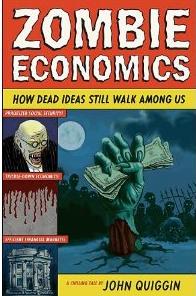(This interview, with John Quiggin, professor of economics at the University of Queensland in St Lucia and author of Zombie Economics: How Dead Ideas Still Walk Among Us, was published in DNA edition dated January 3, 2011.)
 The arresting cover of John Quiggin’s recent book on economics looks more like a scene from Michael Jackson’s Thriller: beneath a night sky, zombies crawl out of cracked graves; blood trails trickle down, and a haunted house shimmers in the moonlight. That’s only because the message from Quiggin, professor of economics at the University of Queensland in St Lucia, is very spooky. “The zombie ideas that brought the global financial system to the brink of meltdown… still walk among us,” he says. These ideas – that “the financial markets are efficient” or that “trickle-down economics works” or that “privatisation is good” – that had been killed and laid to rest, most recently following the near-meltdown in global financial markets in 2008, are now “reviving and clawing their way” back to life – and continue to influence policy. In an interview to DNA Money’s Venky Vembu, Quiggin explains why if these zombie ideas aren’t killed once and for all, they will do even more damage next time. Excerpts:
The arresting cover of John Quiggin’s recent book on economics looks more like a scene from Michael Jackson’s Thriller: beneath a night sky, zombies crawl out of cracked graves; blood trails trickle down, and a haunted house shimmers in the moonlight. That’s only because the message from Quiggin, professor of economics at the University of Queensland in St Lucia, is very spooky. “The zombie ideas that brought the global financial system to the brink of meltdown… still walk among us,” he says. These ideas – that “the financial markets are efficient” or that “trickle-down economics works” or that “privatisation is good” – that had been killed and laid to rest, most recently following the near-meltdown in global financial markets in 2008, are now “reviving and clawing their way” back to life – and continue to influence policy. In an interview to DNA Money’s Venky Vembu, Quiggin explains why if these zombie ideas aren’t killed once and for all, they will do even more damage next time. Excerpts:
 What are these “zombie ideas” and how is that even though they’ve been “killed”, they haunt the policy discourse?
What are these “zombie ideas” and how is that even though they’ve been “killed”, they haunt the policy discourse?
In the book I look at five different ideas that together form a package that’s often called by names such as ‘neoliberalism’ and the Washington Consensus. I’ve used the phrase ‘market liberalism’ to describe these ideas. There are a bunch of different reasons why they keep coming back. One is that people have academic careers around them and are committed to the ideas; a second is that they benefit the interests of powerful groups, who want the ideas to be sustained.
The limits of Keynesian economics have also been exposed by the financial crisis of 2007-08. Is Keynesian economics also a zombie idea?
In my view, it isn’t. Particularly from an Australian perspective, we adopted Keynesian policies and came out a lot better than countries that were either unwilling or unable to adopt Keynesian stimulus, and so have run into the greatest difficulty, particularly some of the countries where the scale of the banking crisis has been such that they’ve had to move rapidly towards austerity.
What accounts for the enduring obsession with ‘taming the business cycle’, and ending the boom-bust cycle?
There are two aspects to it; one is that anybody who works on economic policy wants to avoid deep recessions. But the tendency has been to prematurely announce victory; we saw that with the Great Moderation, and earlier the New Era. We saw the tendency to say they’ve beaten it this time. So far that’s not happened.
If it’s just a Clash of Ideas in the marketplace, what is wrong in having ‘zombie ideas’ float around?
I’m not suggesting that people shouldn’t advance these ideas. But we should recognise what’s wrong with them, and not follow policies based on them, particularly since these ‘zombie ideas’ were the very ideas that brought the global financial system to the brink of meltdown. A striking example is the Efficient Financial Markets Hypothesis: only a few people believe that any more. The problem is more that it’s an idea that continues to guide policy even after overwhelming evidence that has accumulated against it.
Why hasn’t the discourse on an alternative to ‘market liberalism’ found sufficient traction?
In part, it’s a failure of sufficient articulation. In the US, in particular, President Obama had the chance to articulate a strong vision, and on the whole, didn’t do so. He was prepared to make a compromise and then say that’s all we need. We didn’t get the “vision thing” defended vigorously in the political domain. In economic terms, my book is at least an attempt to present these ideas as an alternative to ‘market liberalism’. A lot of people are disillusioned with market liberalism but we haven’t done a very good job of pointing out its failings and the potential alternatives.
We have to begin with a critique of the Efficient Financial Markets Hypothesis. We need a better model of individual behaviour, of what it means to make decisions and how to understand uncertainty. The Efficient Financial Markets Theory assumes we can anticipate every possible contingency and have contracts based on that. That isn’t true. Second, given the way markets work, it’s virtually impossible in deregulated markets to prevent occurrences of bubbles and busts.
Did the financial crisis of 2007-08 nail the fallacy of the Efficient Markets Hypothesis?
The evidence is conclusive, but in a situation where people in the financial markets have gained massively in material wealth and pay, the fact that they are relying on a theory that’s been conclusively falsified doesn’t mean they’re going to give up and go away.
But do its effects linger in policymaking?
Absolutely. We had a period when governments were engaged in more substantial regulation, but we’re already seeing that being chipped away.
If the Efficient Markets Hypothesis is wrong, can one not profit from it by betting the other way?
Some people have bet the other way successfully: Warren Buffett is a classic example. But markets can stay out of equilibrium for a very long time. People can bet against the markets, they can be right, they can bet that a boom is unsound, but it can last long enough for the bet to be called in and for them to lose their money. No one rings a bell at the top.
In India, the dominant narrative is that liberalisation since early 1990s accounts for the faster economic growth. But you say that the rise of India and China doesn’t support the market liberalism idea. Why is that?
I compare India and China to the debate in developed countries. China is the more obvious case. Nobody in the developed country debates is advocating Maoist economic policies: in fact, getting rid of those policies contributed to significant economic growth. In India, the story is much more complicated. Yes, some of the growth in India started before the big reforms, but again a lot of the policies adopted in India – in particular, very stringent import replacement and restrictions on capital imports – are policies that no one has ever really considered adopting in the developed countries.
What are the implications for policymaking of the persistence of zombie economics? Do they heighten the risk of policy errors?
They do, and we’re seeing this in the dominance of the so-called austerity policies. These policies aren’t based on the need to balance budgets in the long run, but rather on the belief that if we can check the government debt in the short term, it will create the room for the private sector to expand. That’s highly influential in Europe, but is also the dominant narrative in the US; the only kind of stimulus being pushed through are tax cuts for the very rich.
There’s been a clamour for a return to the gold standard. How wise is that idea?
The Austrian School of economics has come out of this crisis looking better than the mainstream Chicago School. So, it’s unsurprising that we’re seeing a revival of interest in Austrian ideas. But with a gold standard, we’d effectively have a monetary policy that is determined by the accidents of a commodity market. If somebody discovers a big new goldmine, we have inflation; if somebody discovers a new use for gold, we have deflation. And in the 19th century, when we did of course have a gold standard, it was characterised by a very strong boom-and-bust cycles.
It’s become fashionable to bash central banks, and of course there is much that they have to answer for. But is a political agenda being served by the chatter? Are there risks to having legislative oversight of central banks?
There are risks, of course, but there also risks with having too much independence for central banks. The case for a strictly independent central bank has certainly been undermined by their policies: during the period of the Great Moderation, it appeared the central banks were doing such a marvellous job that you wouldn’t want to interfere with them. And that wasn’t really the case. If we’re going to have active fiscal policy, and we need to coordinate to some extent with monetary policy, it doesn’t fit with the notion of a completely independent central bank. In many ways, Europe’s problem is now that its central bank is too independent and too focussed on an anti-inflation mission.
Has trickle-down economics nothing to show for it? Is it dead?
The trickle-down theory has been propounded since the dawn of time – people with money have had very good reasons to keep it. But the empirical evidence is as strongly against it as any theory can possibly be. In the US case in particular, it’s hard to imagine a more conclusive reputation of seeing an incredible concentration of wealth at the top of the income distribution; but anybody below the median income is in stagnation and left to pay the bills. It has very clearly failed to deliver the goods in the way it was promised.
What are the lessons that India, a mixed economy, can draw from the international experience of privatisation?
One lesson is that you need to avoid dogmatism in this debate. It’s important to be open to the possibility of privatisation in some cases, but also, as we’ve seen in many developed countries, be open to the possibility of nationalisation in other cases. I’m not expecting to see the elimination of public sector productive activity because beyond a certain point, the experience has been that there have been more failures than successes in privatisation, particularly in utilities and infrastructure sectors. Or at least we haven’t seen the kind of results that were promised by the early advocates of privatisation in the 1980s and 1990s.
